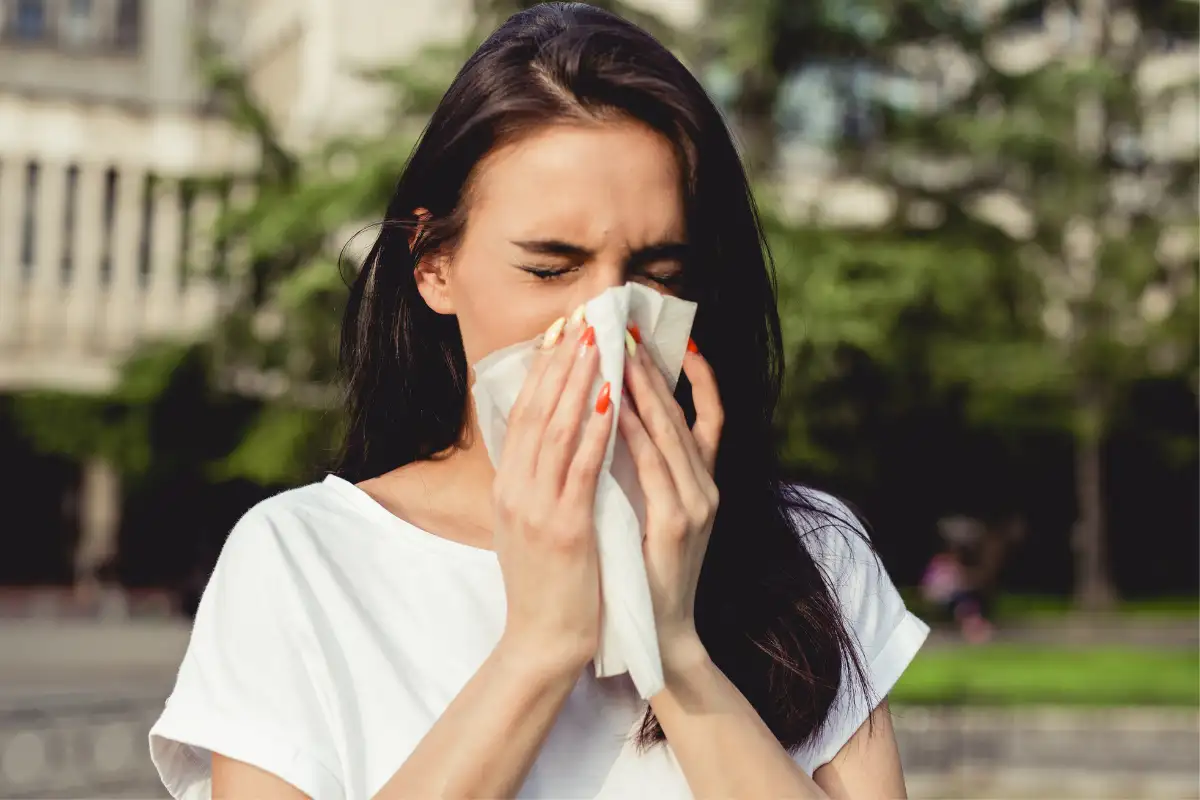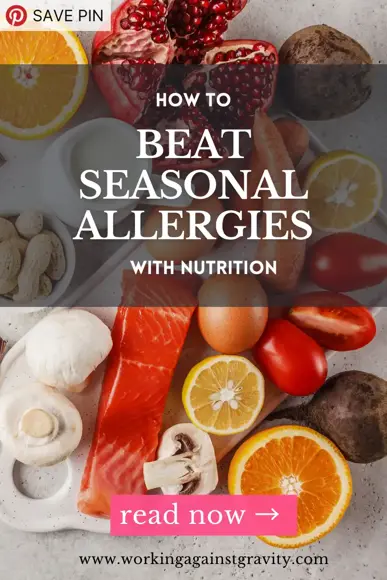
When seasonal allergies hit, it can feel hard to keep up with anything. With the abundance of allergy supplements on the market, it’s easy to forget that there are lifestyle factors that can come into play.
Your diet can directly impact the severity and longevity of your seasonal allergies by supporting yur gut microbiome. This article will teach you how to support your body when seasonal allergies strike and get you back to feeling your best and keeping up with everything you love.

Why Do We Get Seasonal Allergies
Understanding how your diet impacts seasonal allergies starts with understanding common triggers, symptoms, and the impact of food choices on allergic reactions.
Common Triggers for Seasonal Allergies
Common triggers for allergic reactions include histamine exposure, frequent use of antimicrobials that weaken your immune system, a decrease in exposure to bacteria and other antigens through over-sanitation, dietary consumption, and stress. Additional triggers could include food dyes and fragrances.
Advertisement
Common Allergy Symptoms
Common symptoms of seasonal allergies include watery eyes, itchy eyes, sneezing, red eyes, runny nose, and sore throat. Some less common but also relevant symptoms of seasonal allergies include rashes or hives, stomach cramps, and vomiting.
Diet and Seasonal Allergies
Outside of common food allergies like gluten, dairy, tree nuts, and crustaceans, the foods you eat can actually impact the frequency and severity of your seasonal allergies. Food choices can also support your immune system, lessening allergic reaction symptoms. Let’s first focus on what foods we want to include in our diet to minimize seasonal allergies.
Foods to Include In Your Diet to Minimize Seasonal Allergies
Three main food categories will help minimize seasonal allergies: anti-inflammatory foods, omega-3 fatty acids, and probiotics.
Anti-inflammatory Foods and Seasonal Allergies
Anti-inflammatory foods include nutrient-rich fruits, veggies, and healthy fats. Here is a bit of inspiration:
Advertisement
- Green leafy veggies like spinach, kale, and collards
- Fresh fruits such as strawberries, blueberries, cherries, and oranges.
- Prebiotic foods like bananas, garlic, onion, and artichokes also make great additions due to their fiber content and prebiotics that feed your healthy gut flora.
Omega-3 Fatty Acids
Healthy fats to incorporate in your diet consist of omega-3 fatty acids. Great sources of omega-3s include fatty wild-caught fish such as salmon, sardines, and mackerel. Olive oil and nuts, like walnuts and almonds, are also high in omega-3s.. Wild-caught fish and pasture-raised meat contain three to four times more omega 3s on average than farm-raised fish or conventionally-raised meat.
Omega-3 fatty acids contribute to a low-inflammatory diet, critical for gut health and a high-functioning immune system. When you reduce the inflammation in your diet and in your gut as a by-product, you improve your immune response to seasonal allergies.
Probiotic Foods
Many people think about probiotics as a supplement only. However, many foods have probiotics with significantly more live cultures to support healthy gut flora and reduce symptoms. Seasonal allergies begin in the gut; therefore, the more you improve your gut flora, the more you can reduce the symptoms of seasonal allergies. Probiotics, in particular, have been shown to alleviate nasal symptoms and regulate the immune response.
Fermented foods to include in your diet include yogurt, kefir, kimchi, and sauerkraut. Aim to incorporate these foods on a daily basis and as much as a serving with every meal. These live cultures support immune regulation and alleviate symptoms or reduce the development of allergies as a result.
Advertisement
Foods to Avoid to Minimize Seasonal Allergies
Just as foods can minimize seasonal allergies, they can also exacerbate seasonal allergy symptoms.
Foods to avoid include processed foods and alcohol, as these increase inflammation in the body and negatively impact your gut microbiome.
Processed foods to avoid or limit include:
- Processed meats like sausage, hot dogs and pepperoni
- Chips
- Baked goods
- Ice cream
- Sugary breakfast cereals
- We also recommend limiting your intake of fried foods and alcohol.
Fried foods cooked in processed oils are heated to levels that form trans fat. Trans fat intake has been correlated with rates of allergies and asthma, likely due to the inflammatory impact on the body. It is best to avoid consuming trans fats and processed meats while keeping sugar and alcohol in moderation.
Advertisement
Other Lifestyle Factors that Impact Allergy Severity
Aside from diet, the best way to reduce inflammation in the body is to reduce stress. Stress can trigger an allergic reaction, and chronic stress can disrupt the gut microbiome over time.
You can manage stress through self-care, diet, exercise, sleep, and hydration. Getting seven to nine hours of quality sleep each night is a great focus to reduce stress on the body and enter a rest and digestion state.
Exercise is also a great way to release stress in the body, particularly in low-intensity activities, including walking, biking, swimming, pilates, and yoga.
Final Thoughts on Diet and Seasonal Allergies
If you have ever experienced seasonal allergies, you know how disruptive symptoms can be to your lifestyle, from work to exercise to relationships. With this knowledge, you can begin taking action through lifestyle choices that reduce allergic reactions and symptoms.
Advertisement
Aim to eat a diet high in fruits, veggies, omega-3 fats, and probiotics. Do your best to limit sugar and alcohol intake while avoiding ultra-processed and fried foods. Focus on sleep hygiene, daily movement, and overall stress management. Don’t let allergies get in the way of doing what you love this year!
References:
“Foods That Fight Inflammation.” Harvard Health, 2024 Harvard Health Publishing of The President and Fellows of Harvard College, 16 Nov. 2021, www.health.harvard.edu/staying-healthy/foods-that-fight-inflammation.
Sinclair, Stephanie, et al. “A Guide to Seasonal Allergies.” 2023, https://earthley.com.
Rachel Holcomb
Schedule a Free Intro Call
Working Against Gravity has led the macro tracking and health space for over a decade. Our team doesn’t just understand the science of nutrition—we’ve spent years mastering the art of tailoring it to fit your life. That means no cookie-cutter plans, just real strategies that have worked for over 30,000 people.
Schedule a free call with our team to learn how working with a 1-on-1 WAG coach will help you reach your goals.



